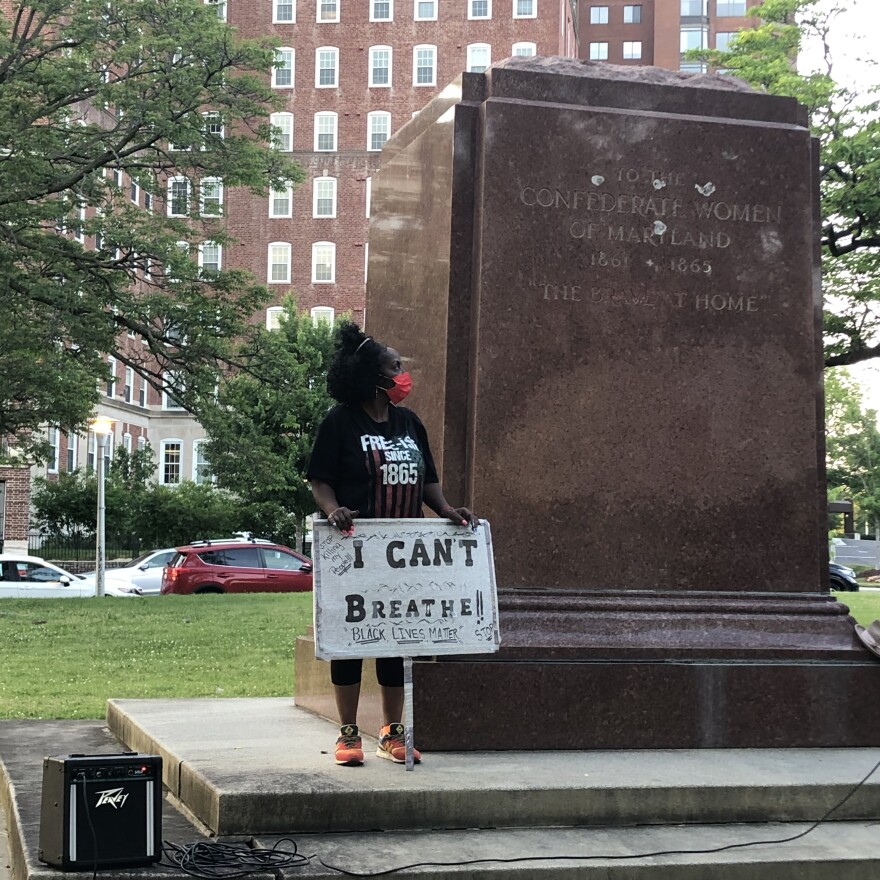Baltimore faith and community leaders held an outdoor vigil Tuesday night to mark the first anniversary of the death of George Floyd at the hands of Minneapolis police.
Floyd, an unarmed Black man, was murdered by then Officer Derek Chauvin, who pressed his knee against Floyd’s neck for 9 minutes and 29 seconds.
His murder sparked peaceful protests in Baltimore, where thousands of people filled the streets, shouting Floyd’s last words: “I can’t breathe.”
The vigil took place at Bishop Square Park, at University Parkway and Charles Street in front of what was once the Confederate Women's Monument.
Rev. Dr. Alvin Hathaway Sr from the Union Baptist Church presided. He was joined by leaders of various religious backgrounds.
“Much of my life's journey has had as bookends, public executions,” Hathaway said. He was a child when 14 year old Emmett Till was lynched by white men in 1955.
Hathaway said the vigil was a space not only to mourn, but also to look forward. He thought about what sort of world his three grandchildren, and future generations, would grow up in.
“My hope is that we will not have those kinds of atrocious acts that jar your spirit,” he said.
Rev. Ramelle McCall, the rector of Holy Trinity Church in West Baltimore, lamented the burden that people of color have in educating others about racism.
“I'm tired of having to explain it over and over and over and over and over and over and over again. I'm tired of it,” he said.
Rabbi Daniel Burg recalled feeling grateful on April 20, when Derek Chauvin was found guilty.
He said that’s not a date he usually feels good about. It’s his birthday, but it’s also the birthday of Adolf Hitler, the date of the Columbine shooting, the day after the death of Freddie Gray in police custody in Baltimore in 2015.
As grateful as he was for Chauvin’s conviction, Burg said the country has a long way to go.
“I realized that for every Derek Chauvin, there are hundreds, thousands of names of those whose acts of hateful violence have gone unanswered by the halls of justice,” Burg said.
Iman El-Amin from the Muslim Community Cultural Center of Baltimore said after witnessing violence against Black people, the April 20 verdict gave him some hope, but reminded those gathered of a familiar chant: “no justice, no peace.”
“In order for us to get to a peaceful environment, in neighborhoods and communities, in order for us to get to that peace, we have to establish justice."
Baltimore Police Commissioner Michael Harrison also spoke. Hours before, his department had announced a new ”strategic framework to advance equity.”
He reflected on how he felt when he saw the footage of Floyd’s murder, and said police chiefs must hold their officers accountable.
“I had to see it through the lens of a Black husband, a Black father and a Black man,” Harrison said. “It was shocking to my conscience.”
Throughout the service, those gathered paid homage to other Black Americans who died at the hands of police.
“Michael Brown, Michael Brown. Say his name,” they chanted. “Alton Sterling, Alton Sterling. Say his name. Freddie Gray, Freddie Gray. Say his name.”



